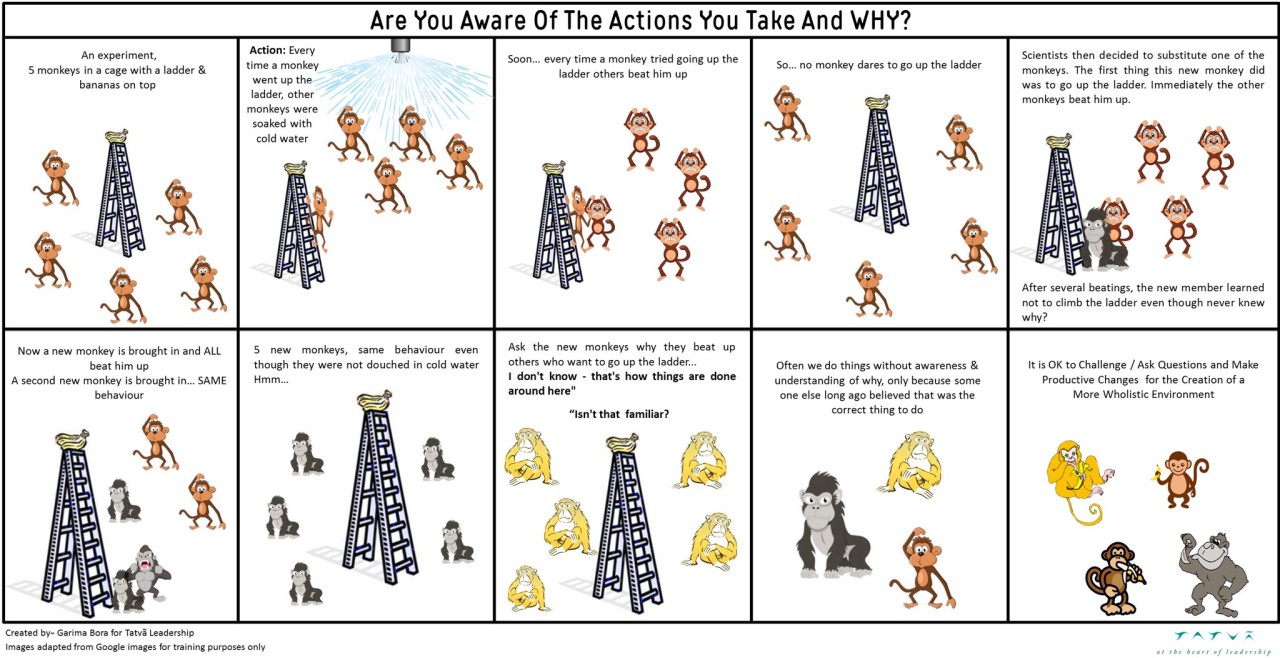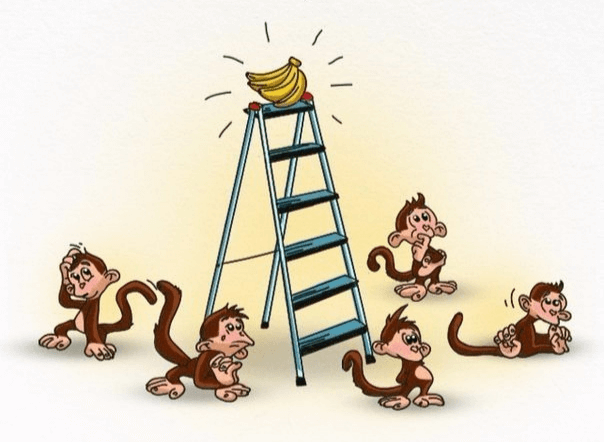Have you ever heard the story of the 5 Monkeys Experiment?
It goes like this:

5 monkeys were placed in a cage as part of an experiment. In the middle of the cage was a ladder with bananas on the top rung. Every time a monkey tried to climb the ladder, the experimenter sprayed all of the monkeys with icy water. Eventually, each time a monkey started to climb the ladder, the other ones pulled him off and beat him up so they could avoid the icy spray. Soon, no monkey dared go up the ladder.
The experimenter then substituted one of the monkeys in the cage with a new monkey. The first thing the new monkey did was try to climb the ladder to reach the bananas. After several beatings, the new monkey learned the social norm. He never knew “why” the other monkeys wouldn’t let him go for the bananas because he had never been sprayed with ice water, but he quickly learned that this behaviour would not be tolerated by the other monkeys.
One by one, each of the monkeys in the cage was substituted for a new monkey until none of the original group remained. Every time a new monkey went up the ladder, the rest of the group pulled him off, even those who had never been sprayed with the icy water.
By the end of the experiment, the 5 monkeys in the cage had learned to follow the rule (don’t go for the bananas), without any of them knowing the reason why (we’ll all get sprayed by icy water). If we could have asked the monkeys for their rationale behind not letting their cage mates climb the ladder, their answer would probably be: “I don’t know, that’s just how its always been done.”
This story, whether real or a fable, captures a pervasive theme in many organizational cultures: We tend to do things the way we’re told they’ve always been done without questioning or revisiting the reason behind it, even long after that reason ceases to exist.
This could be evolutionary advantage to why teenagers rebel in adolescence. They don’t want to listen to their parents, they want to find out their own way, they want to push boundaries.
The core problem is that people just follow the crowd because they don’t do the hard work to evaluate the real issue and to get to the heart of it to realise that it’s no longer necessary.
A first principle is a basic assumption that cannot be deduced any further. Over two thousand years ago, Aristotle defined a first principle as “the first basis from which a thing is known.” First principles thinking is a fancy way of saying “think like a scientist.” Scientists don’t assume anything.
Don’t follow the Crowd
My parents used to warn me of following the crowd.
When they asked me why I did something and I’d say: “Well my friend Peter did it”
They used to say – if Peter said to jump off a cliff, would you do it?
Thinking for myself was an important thing they tried to instill in me.
Examples of Dysfuntional Herding
1. Corporate Dress Codes:
• Situation: Many companies enforce strict formal dress codes based on traditions.
• Better Alternative: More casual attire might increase comfort and productivity.
2. Disregarding Innovative Ideas:
• Situation: New employees’ innovative ideas get dismissed because “that’s not how we do things here.”
• Better Alternative: Embracing new perspectives can lead to improvements and innovation.
3. Traditional Education Methods:
• Situation: Schools continue using rote learning methods.
• Better Alternative: Implementing interactive and problem-based learning can improve student engagement and understanding.
4. Family Rituals:
• Situation: Families adhere to holiday traditions even if they no longer hold meaning for them.
• Better Alternative: Creating new, meaningful rituals can better serve their values and preferences.
5. Medical Practices:
• Situation: Hospitals adhere to traditional but outdated medical procedures.
• Better Alternative: Adopting new, evidence-based practices could improve patient outcomes.
6. Workplace Hierarchies:
• Situation: Employers maintain rigid hierarchical structures.
• Better Alternative: Flat organizations can encourage better communication and quicker decision-making.
7. Urban Planning:
• Situation: Cities maintain inefficient traffic systems out of tradition.
• Better Alternative: Modernizing to include bike lanes and better public transportation could reduce congestion and pollution.
8. Religious Practices:
• Situation: Congregations follow rituals without understanding their origins.
• Better Alternative: Encouraging exploration and understanding of the practice can make it more meaningful.
9. Military Procedures:
• Situation: Military units follow outdated protocols from past wars.
• Better Alternative: Updating tactics and strategies to reflect current technology and information can improve effectiveness.
10. Voting Practices:
• Situation: People vote along party lines without understanding the issues or candidates.
• Better Alternative: Educating voters to make informed choices can lead to better governance.
These instances of blind conformity showcase how norms and traditions persist even when they no longer serve a practical purpose, and how questioning them could yield more effective and fulfilling alternatives.
